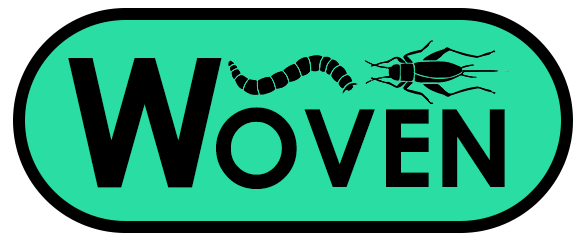 Interview with Matt Anderson, Director of Woven
Interview with Matt Anderson, Director of Woven
Tell us about Woven Network
The idea behind Woven was formulated by Nick Rousseau, now the Managing Director, after having seen in the media the potential insects have as a food of the future. After getting in touch with some of the then current stakeholders in the sector, there was a realisation of a need for a national organisation that could give a much larger voice to these smaller players, bringing them together and bridging the gap between different areas within the sector.
This has since evolved into providing a platform for businesses and researchers alike, both new and established, to gain access to and learn from the experiences of others, be that acquiring new elements to their supply chain, collaborating with other researchers in the field, or getting legal or regulatory advice. The list goes on. Our first event is a joint conference with the Royal Entomological Society being held on April 11th at the University of Nottingham (details and tickets here).
Do you think that the new Novel Foods regulations are enough to make the edible insects sector take off?
The Novel Foods application process will be one of the things Woven will be focussing on in the coming year as it will be of greatest concern to our members and to European businesses in the sector as a whole. Whilst, in my opinion, insect-based products being classed as “novel foods” is not necessarily right for them (thinking globally), regulations like these are essential for a growing industry, especially one such as this where there may be concerns for certain people (e.g. allergens or microbial content).
On the Woven agenda this year is actually to work with the British Standards Institute (BSI) in coming up with industry-specific regulations that all those operating within the market will have to abide to. The aim here, as is the case in any food industry, is not only to protect consumer health and satisfaction, but also to protect those currently in the market that do their jobs correctly. The last thing that we want is for a new company to start selling insect products that may put consumer health at risk, ultimately causing huge problems for the industry as a whole, not just nationally, but globally.
As far as the sector taking off is concerned, it is clear that it already has enough momentum to get it past the “just a fad” threshold and that this will just be a matter of time. Many believe that there are just too many invested players in too many countries for it not to make a real impact eventually.
As a Woven Director, what more would you ask to the EU Institutions?
First and foremost, I would like to know that there were people in organisations like the European Food Safety Authority (EFSA) that were willing to help the industry grow. Legislatory development can often slow things down for businesses, and this will be especially true if the decision makers are not open to the idea of change. A good example can be seen in the UN’s FAO, where we once had Paul Vantomme there championing the industry, but no one has since taken up his role since his retirement.
How important will lobbying be for this fast-growing industry?
Lobbying institutions both at the European and national levels will no doubt be very important somewhere down the line, and this is where national representative organisations like Woven, VENIK (Netherlands), the FFPIDI (France), and the IPIFF (Belgium) will be of real benefit to the European industry.
Will having a shared spokesperson help to improve relationships with EU Institutions, or do we need to act at a higher level, using the FAO, for example?
It is all about hierarchy: a national institution representing several companies and researchers will have a much more powerful voice than single players will, and this is ultimately, I believe, what every European country that is serious about developing this industry needs to start with. These national organisations then also need to have some degree of cooperation between each other to be most effective.
How is the edible insects market growing in UK?
The UK’s industry is finally catching up with the likes of the Netherlands and Belgium, with more and more entrepreneurs taking an interest in developing insect-based products. As far as I am aware, there are still no operational industrial insect farms aimed solely at either the food or feed markets, but this will soon change over the next couple of months with two or three companies aiming to do just that. Much larger players are also beginning to take an interest in the industry so it is indeed exciting times here!
Actually, one of the things Woven is trying to do is get a picture of the current UK industry, so for those involved in the UK, we have a couple of short surveys – one for businesses and one for researchers. The findings from these will be presented at our conference in April (respecting confidentiality, of course).
Do you think showing insects “as they are” could be a negative approach to communicate an industry some people say is in need for normalisation?
I have very mixed feeling on this at the moment, because whilst I believe it will be important for people to come “face-to-face” with edible insects at some point to help normalise the idea, the majority of UK consumers are not yet ready for this so it would likely have a polarising effect. Only the open-minded or those that are already interested would likely go for whole insects at the moment, so it will probably do more harm than good. For now, I think it’s best to stick with insect flour-based products that conceal the insects, be that through protein bars such as those by Eat Grub or Crobar, or through more savoury products like burgers or pasta.
What’s the future of entomophagy in the western world?
It’s difficult to deny the momentum that the industry has developed and many think that this is now large enough to be unstoppable. Of course, we do have some unique challenges here in Europe, but with adequate cooperation between players, this should not pose too much of a problem. What we don’t know is when this will start to leak into the mainstream market in a bigger way, but again, it is just a matter of time. In the meantime, we need to ensure that whilst still in its infancy, the industry protects itself by making sure that all of the health and safety boxes are ticked and everyone is focussed on providing consumers with high quality products.





